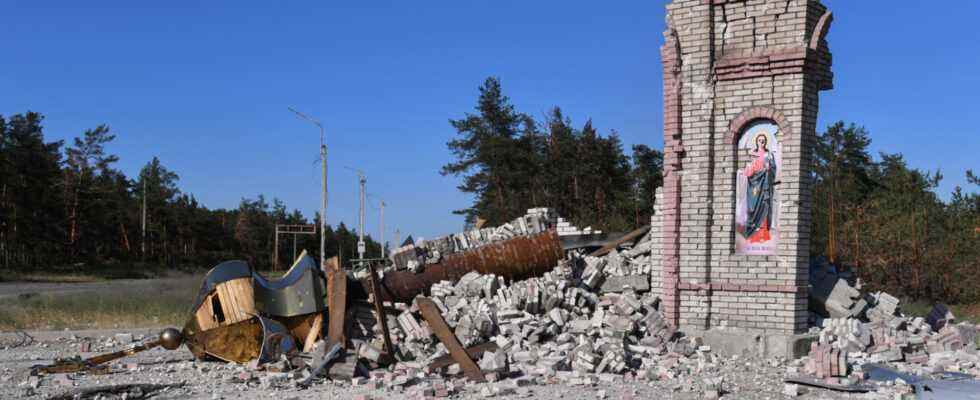“The situation in Severodonetsk (east) is extremely difficult,” admitted the Ukrainian governor of the Lugansk region, Serguiï Gaïdaï. The enemy wants to completely isolate Severodonetsk by preventing any passage of men or ammunition, he added, saying he fears that he will launch “all his reserves to take the city” within 48 hours.
Information to remember:
- Fighting intensifies in eastern Ukraine, which has become a land ‘covered in blood’
- Turkey blocks Sweden and Finland’s NATO membership applications
- Amnesty International accuses Russia of war crimes
- Ukrainian justice has opened more than 12,000 war crimes investigations
“The enemy concentrated most of their efforts in the northern Lugansk region” on Sunday, where they “use artillery on a large scale and, unfortunately, have a 10-to-one advantage,” explained on Facebook. Valeri Zalouzhny, the commander-in-chief of the Ukrainian army.
“We continue to hold our positions”, he nevertheless assured, affirming that “every meter of Ukrainian land there is covered in blood – but not only ours, but also that of the occupier”.
Young men used as “cannon fodder”
Ukrainian President Volodymyr Zelensky in his evening video message on Sunday called the latest fighting in Severodonetsk “very violent”, saying Moscow is deploying insufficiently trained troops and using its young men as “cannon fodder”.
The capture of this city would open up the road to another major city, Kramatorsk, in Moscow, a stage to conquer the entire Donbass basin, a mainly Russian-speaking region partly held by pro-Russian separatists since 2014.
On the diplomatic level, after promising kyiv the day before a response “by the end of next week” to Ukraine’s request to start a process of joining the European Union, the President of the European Commission, Ursula von der Leyen, acknowledged that “the challenge (would be) to come out of the European Council (scheduled for June 23 and 24) with a united position that reflects the enormity of these historic decisions”.
Finding a solution to the risk of a serious food crisis
For their part, the Member States of the World Trade Organization (WTO) met on Sunday in Geneva with the particular objective of helping to find a solution to the risk of a serious food crisis that the Russia’s invasion of Ukraine, whose fertile lands traditionally feed hundreds of millions of people on the planet.
Tensions surfaced in a closed-door meeting where delegates took the floor to condemn Russian aggression. The Ukrainian delegate, who also spoke, was greeted with a standing ovation, according to WTO spokesman Dan Pruzin.
Then, just before Russian Economic Development Minister Maxim Rechetnikov took the floor, around 30 delegates “left the room,” Pruzin said.
Turkey blocks Sweden and Finland’s NATO membership applications
On the NATO side, the secretary general of the Atlantic Alliance, Jens Stoltenberg, warned that Turkey’s blocking of membership applications from Sweden and Finland, pushed by the Russian invasion of Ukraine after decades of non-alignment, could last. Ankara accuses them of offering refuge to the Kurdistan Workers’ Party (PKK), a group classified as “terrorist” by Turkey and its Western allies.
On the military side, the Russian Ministry of Defense said it had destroyed in Tchortkiv, 140 km from the border with Romania, “a large warehouse of anti-tank missile systems, portable air defense systems and shells supplied to the regime of kyiv by the United States and European countries”.
The strike on this city, located in the west, so far relatively spared, left 22 injured, according to the governor of this region. According to the Ukrainian president, “there was no tactical or strategic interest in this strike, as in the vast majority of other Russian strikes. It is terrorism, just terrorism”.
Fighting turns to trench warfare
Further south, in the Donetsk region, the Ukrainian presidency said that “the Russians (intensified) their efforts to destroy essential infrastructure”.
At the other end of the front line, in Mikolaiv, a major port on the Dnieper estuary in the south, the Russian advance has been halted on the outskirts of the town, the fighting is turning into trench warfare and the authorities take the measure of the bombing of infrastructure, according to a team of AFP journalists on the spot.
There, the Ukrainian army dug trenches facing the Russians. “The Russians are bluffing. There are many of them, they have a lot of weapons, old and new, but they are not soldiers,” Serguiy, 54, a Ukrainian brigade captain, said on Sunday as his comrades in arms fired. towards enemy positions.
Amnesty International accuses Russia of war crimes
On Monday, Amnesty International accused Russia of war crimes in Ukraine, saying hundreds of civilians had died in relentless attacks on Kharkiv, many carried out with cluster bombs.
Following an in-depth investigation, the human rights NGO claims to have found evidence showing that in seven attacks on neighborhoods in Ukraine’s second city, in the north-east of the country, Russian forces have used 9N210 and 9N235 cluster munitions and cluster bombs, two categories prohibited by international treaties.
“People have been killed in their homes and on the streets, on playgrounds and in cemeteries, as they waited in line for humanitarian aid or shopping for food and medicine,” Donatella said. Rovera, crisis and conflict researcher at Amnesty headquarters.
Ukrainian justice has opened more than 12,000 war crimes investigations in the country since the start of the Russian invasion, according to the prosecution.
